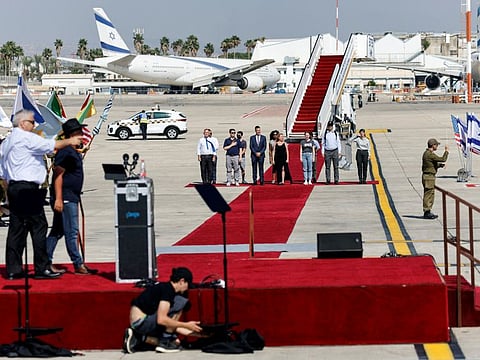Biden seeks new chapter as he embarks on Mideast trip
US president will make ‘major statement’ on his vision for the region, WHite House says

WASHINGTON: President Joe Biden will try to reaffirm and recalibrate US relationships in the Middle East during his first trip to the region since taking office beginning on Wednesday in Israel.
The US president’s next stop will be Saudi Arabia.
Looming over Biden’s travels will be his administration’s struggle to rejuvenate the Iran nuclear deal that was reached by Barack Obama in 2015 and abandoned by Donald Trump in 2018. Negotiations stalled last month, and Iran is believed to be closer than ever to having the ability to build a nuclear weapon. Failure to reach a diplomatic solution could increase the chance of conflict in an already combustible neighbourhood.
“He’s going to face a region that’s long on problems with very few solutions,’’ said Aaron David Miller, a former State Department official who is now a senior fellow at the Carnegie Endowment for International Peace.
In addition, Biden has been more focused on Europe, which is experiencing its worst armed conflict since World War II, and Asia, where he’s been trying to reorientate US foreign policy.
Jake Sullivan, the president’s national security adviser, said the US needs to remain “intensively engaged’’ in the Middle East because the region is “deeply interwoven with the rest of the world.’’
“If we act now to create a peaceful and stable region, it will pay dividends for the American national interests and for the American people for years to come,” he said at a White House briefing.
In addition to meetings with Israeli and Palestinian politicians, Biden is expected to visit an Israeli missile defence installation and the Yad Vashem Holocaust Memorial. He’s also slated to receive Israel’s Presidential Medal of Honor and visit with US athletes taking part in the Maccabiah Games, which involves thousands of Jewish and Israeli athletes from around the globe.
Gulf summit
He travels to Saudi Arabia on Friday and he’ll attend a summit of the Gulf Cooperation Council there on Saturday, which brings together Arab leaders from the region. Sullivan said the president will make a “major statement’’ on his vision for the Middle East region.
Biden made only a glancing reference to working with Saudi Arabia to “help stabilise oil markets’’ when he wrote an op-ed in the Washington Post.
He said he wants “to reorient — but not rupture” the US relationship with Saudi Arabia.
Brian Katulis, vice-president of policy at the Middle East Institute, said Biden’s shifting approach shows he’s no longer seeking the dramatic break from Trump that he originally envisioned.
“I think reality just set in,” Katulis said, describing the administration’s views on the region as evolving from “adolescence to a much more mature phase.’’
Major stumbling block
A significant stumbling block has been the lack of a new nuclear agreement with Iran. The last round of negotiations in Doha ended without success. The Saudis, as well as the Israelis, have been frustrated that the White House has not abandoned efforts to revive the deal with Tehran.
“We want the Saudis to feel that the US is committed to its security long term, and that, in turn, the Saudis are committed to US national security interests as well,’’ said Richard Goldberg, who served as a senior National Security Council adviser on Iran in the Trump administration.
Biden hopes to foster closer ties during his trip, and it’s notable that he will be the first US president to travel directly from Israel to Saudi Arabia.
Although no one expects the two countries to immediately normalise relations, there could be incremental steps taken, such as by allowing Israeli flights to cross through Saudi airspace.
“The tectonic plates are shifting,’’ said Dennis Ross, a former American diplomat who is now a distinguished fellow at the Washington Institute for Near East Policy. “That’s what’s happening.’’
It’s unclear whether any of these changes could eventually lead to a resolution of the decades-old conflict between Israel and the Palestinians.
Peace talks are moribund, nor is there much chance of reviving them at the current moment.
Yair Lapid, Israel’s caretaker prime minister, leads a centrist political party that is more aligned with Biden than the country’s recent conservative leaders. However, new elections are being held in November, and Israelis could decide to revert to Benjamin Netanyahu, a right-wing leader who has clashed with Biden in the past.
A warm visit from Biden could boost Lapid’s chances, but any overt shows of support for him could backfire.
Either way, the chaotic state of Israeli politics — this will be the fifth election in three years — means little can be accomplished in the interim.
“This is not the moment to try to revive the peace process,’’ said Martin Indyk, a distinguished fellow at the Council on Foreign Relations who was Obama’s special envoy for Israeli-Palestinian negotiations.
Still, Indyk encouraged Biden to express his support for a two-state solution, however distant the possibility may be.
“If you ignore the Palestinian issue, it will come back to bite you,” he said. “And eventually it will explode. And that’s not in anybody’s interest.’’







